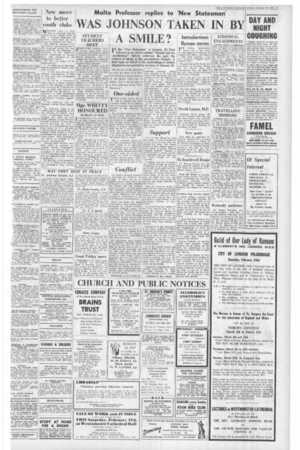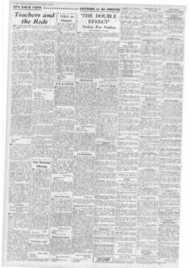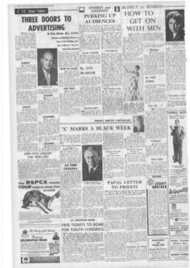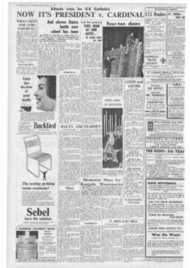Page 7, 16th February 1962
Page 7

Report an error
Noticed an error on this page?If you've noticed an error in this article please click here to report it.
Tags
Share
Related articles
Better For Church And State
Vapourings'
Phantom 'certitude' Of Mr. Johnson
Hatchet Work On The Church The Church
Why In Quotes?
WAS JOHNSON TAKEN IN BY A SMILE?
I N the "New Statesman" of January 19, Paul Johnson in an article entitled "Mintoff and the Archbishop" bitterly criticised the part the Church is taking in the pre-elections struggle. A brief reply on behalf of the Archbishop, to certain allegations was printed in our issue of January 26.
On the eve of the elections, we print the views of the Reverend Professor Gerald Seaston of the Royal University of Malta. This is the full text of a letter addressed to the "New Statesman".
One-sided
YOUR readers should not be left to suppose that Paul Johnson's article of 19 January gives an accurate and balanced account of the situation in Malta.
The one-sided picture presented in stalk black and white-of a backward-looking Church clinging tenaciously to its temporal power and material wealth, fighting a purely political battle against the forces of progress and enlightenment led by a gallant popular leader who deserves the support of all right-thinking persons-this is of course the picture that Mintoff himself likes to project.
That a journalist making his first brief acquaintance with Malta should accept it so uncritically and publicise it so dogmatically is astonishing. One can only suppose that Paul Johnson came with his mind made up, or that he yielded too easily to Mintoff's "immense private charm". Others too have experienced that charm; it is the smile on the face or the tiger.
Conflict
The article's historical preamble is interesting but irrelevant. The Knights of Malta and the Inquisitors are no more. What has arisen now is a conflict between the Church and one political party; its cause a party leader who is himself a lapsed Catholic and a life-long anti-clerical, with a "fierce intolerance of either criticism or competition" (to use Paul Johnson's own description).
Under this leader the Malta Labour Party, which used to have thousands of zealous Catholic supporters including priests, has ceased to be a Workers Party in any true sense, and has been turned into the "Malta Liberation Movement". Liberation from what? from British "colonialism" and the Catholic Church, which according to Mintoff are joined in unholy alliance against him.
The quarrel with the Church is in fact of Mintoff's making. It is part of his policy. Not surprisingly, the Church has been forced into active self-defence.
The unfortunate Malta Labour Party, Mintoff's instrument, which in 1949 he split and put out of office for several years as part of his fight for the leadership, has now been split again. The new Christian Workers Party has been created by those former Labour supporters who not only tired of Mintoff's "fierce intolerance of criticism or competition" but also saw with dismay the direction in which he was leading the partytowards contacts and alliances and attitudes quite incompatible with its electoral pledges.
Membership of the Socialist In
ternational (accepted without much comment at the time), the visits to Tito and Nasser and their promises of aid. the affiliation of the party to the Afro-Asian Peoples' Solidarity Organisation (Malta being neither Afro nor Asian and AAPSO being Communist-inspired) these, along with anti-clerical diet' ibes and final open defiance of the Bishops were the successive steps which led to the Interdiction of Mintoff and his executive, and the loss of thousands of their supporters.
In his electoral programme of 1953 the same man had written, "In all our actions we take our inspiration from the teachings of Our Lord Jesus Christ as propounded by the Roman Catholic Church . . . we shall continue to apply the Christian tenets of Rerum Novartun and Quadragesbno Anno, and we shall continue to combat Communism in all its forms".
Support
It is true that Mintoff has kept the support of some thousands of devoted followers-how many the election will show. They consist mainly (as Paul Johnson seems to have noted) of simple illiterate workmen. Mintoff's "capacity to spell-hind Malta's volatile crowds" is undeniable, and his clubs and his Youth Brigade are well organised.
In stating, only too accurately, that Mintoff through his network of clubs has set up "a real counterpart to the parish pulpit and confessional" Paul Johnson reveals more than he realises. Had he reflected longer on his own statement he might have seen that Minton' is bent on destroying the spiritual and moral authority of the Church.
There are some, no doubt, to whom this will seem a good thing. But educated and well-instructed Maltese Catholics (who are quite numerous, and I wish Paul Johnson had met some of them) are not likely to accept Mintoff as the heaven-sent reformer of their Church.
On several important matters of fact Paul Johnson must be corrected. No priest as Minister of Education opposed compulsory education. That the Church opposed income tax is not true, and has been authoritatively denied by Sir Paul Boffa, Prime Minister at the time.
Domination of the University? I have been a professor of Malta University for several years and a member of its Council and Senate, and have seen no sign of this "domination". (It is true we have a Faculty of Theology, which Mintoff when Prime Minister proposed to abolish.) As to the Church owning one third of Malta, let me say with pardonable exasperation that anyone repeating that hoary old falsehood deserves a month in the Inquisitor's snakepit. The true estimate, which might have been obtained from the Archbishop, is about one seventeenth.
Church bells rung unfairly, even illegally? Regrettably, yes. There has been inevitably a "Don Camillo" element in the reaction Continued in next column
blog comments powered by Disqus









